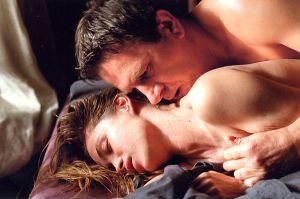NOTE: THIS ENTRY HAS BEEN SALVAGED FROM THIS SITE AND REPOSTED UNEDITED ON 6/18/2010. SOME INFORMATION MAY BE OUTDATED, AND OUTGOING LINKS HAVE NOT BEEN INSPECTED FOR REPUBLICATION. COMMENTS CAN BE FOUND HERE.
To the guy who decided it would be a good idea to loudly cough the word *boring* on his way out of the theatre in the middle of the Story of Marie and Julien Friday night:
 It might please you to learn that, within a few minutes of your departure, the clarity of your critique had sunk in to each and every one of us in the audience. That, though we'd been too blinded by our allegiance to the ideal of "art cinema" to recognize it on our own, your analysis spurred us to realize that "the Emperor Had No Clothes", and to walk, one by one and two by two, out into the lobby of the Pacific Film Archive, where Susan Oxtoby herself reassured us all that never again would the PFA make the mistake of programming a film like it.
It might please you to learn that, within a few minutes of your departure, the clarity of your critique had sunk in to each and every one of us in the audience. That, though we'd been too blinded by our allegiance to the ideal of "art cinema" to recognize it on our own, your analysis spurred us to realize that "the Emperor Had No Clothes", and to walk, one by one and two by two, out into the lobby of the Pacific Film Archive, where Susan Oxtoby herself reassured us all that never again would the PFA make the mistake of programming a film like it.Well, I'm afraid that none of that actually happened. There were a few chuckles after your departing remark, and then we all remained in our seats, enjoying, or perhaps (as I didn't have the wherewithal to conduct a survey) being bored by the rest of the film. This does not make us more virtuous than the people who, in case you thought you were being terribly original, walked out of the film before you did. But it certainly doesn't make you any better or smarter or more "with it" or honest than us either.
To be sure, this is a challenging film, and I'm not all that surprised no Frisco Bay film programmer had wanted to bring it to us before. To be truthful, I'm not certain what I'd have made of its first hour or so if I hadn't seen its elder cousin Celine and Julie Go Boating last month. Both films are mysteries where the mystery is little more than hinted at during the first half of the film, which, on a single viewing apiece for me so far, I take as instead the terrain for helping us get to know the characters and the nature of their relationship. In each case the first half is the foundation for the truly astonishing material that comes in the second half. In the case of Celine and Julie Go Boating the title characters are so naturally appealing that I didn't care at all that I wasn't getting a sense of narrative driving the film. In the case of the Story of Marie and Julien that's slightly less the case, but I was no longer a Rivette virgin and it was probably my trust that the director would at some point take me into some extraordinary realm like the one I'd so loved in Celine and Julie Go Boating that prevented the sense that I might have been "missing something" (or that the director, or the rest of the audience might have been) from taking hold. It didn't even occur to me to look at my watch (though Rivette had placed all those clocks on the screen) or be bored; I was, as one character put it, "waiting." Which paid off in a big way, delivering a third act as emotional and suspenseful as a great Val Lewton film, while following Rivette's tradition of guiding his audience a step closer to an intellectual understanding of the nature and "rules" of character, drama and cinema. I'd be sorry you had to miss it, if only you hadn't been such an ass about it.
But most of all I'm confused as to how you could possibly choose a sex scene with Emmanuelle Béart to be the moment to walk out on. What's wrong with you, man?




